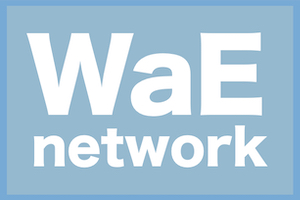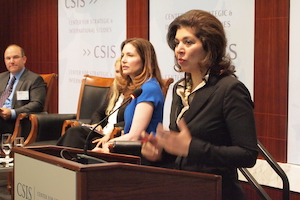Women & Extremism
ISD examines the gender component of disinformation, and the role of women within and against extremist movements.
In the last decade, ISD has pioneered new research and initiatives to address the presence of women within violent extremist organisations and develop new ways for women to counter extremism around the world.
Women play an important role in both online and offline radicalisation and recruitment to extremist groups. However, women can also act as early warning systems and influential counter-agents in the fight against these movements. ISD’s work has looked at all dimensions of the gender dynamics of these issues.
Gender-focused research and commentary
ISD has conducted a range of research the addresses issues of extremism, hate and disinformation through a gender lens. This has included everything from research into the gender dynamics of Islamist extremism (Becoming Mulan and Till Martyrdom Do Us Part, Women, Girls and Islamist Extremism) to analysis of the misogynistic aspects of hatred targeting female political candidates (Public Figures, Public Rage).
Our team regularly speak in the media on the role of women in these issues, including on why more women are turning to the far-right (as featured in this Radio 4 documentary with Julia Ebner and a film for The Telegraph, “Rise of the women haters: Inside the dark world of the British ‘incels’“). We also regularly publish on our blog on the gender dimensions of disinformation, such as this Digital Dispatches post, “Online Abuse and Disinformation are Obstacles to Gender Equality in a post-COVID World.”
Women & Extremism Toolkit
The return of women and girls from former ISIS held territories presents new and difficult challenges for governments, communities and frontline practitioners. The importance of disengagement and deradicalisation work with this cohort of women cannot be underestimated. ISD’s Women, Girls and Islamist Extremism Toolkit provides evidence-based guidance for policymakers and practitioners, drawn from the expertise of intervention providers and practitioners in the UK and the Netherlands who have worked with over 250 females who were affiliated with Islamist extremism.
The toolkit is designed to highlight effective practices and processes for intervention provision with women and girls, as well as to lay out existing policy frameworks and practical tools available for those involved in these cases. The toolkit’s insights and recommendations are primarily designed to support individuals directly involved in the provision of tertiary interventions with women and girls, but also to provide guidance for practitioners and broader community stakeholders involved in safeguarding at-risk women and girls in the Netherlands and the UK.
The Women and Extremism Network (WaE)
The Women and Extremism Network (WaE), founded at the inaugural Women and Extremism Summit in Washington, DC, in 2015, brings together policymakers, academics and activists to increase female-led counter-narrative work and seed grassroots counter-extremism networks. This approach allows for greater understanding of how women are radicalised and facilitates an active network of women to better counter this trend.


The inaugural Women and Extremism Summit
Washington, DC, 2015.
ISD’s Women and Extremism team

Jacob Davey
Director of Policy & Research, Counter-Hate






Charlotte Moeyens
Senior Manager, Networks & Civic Action



Charlotte Moeyens
Senior Manager, Networks & Civic Action



Cécile Simmons
Research Manager



